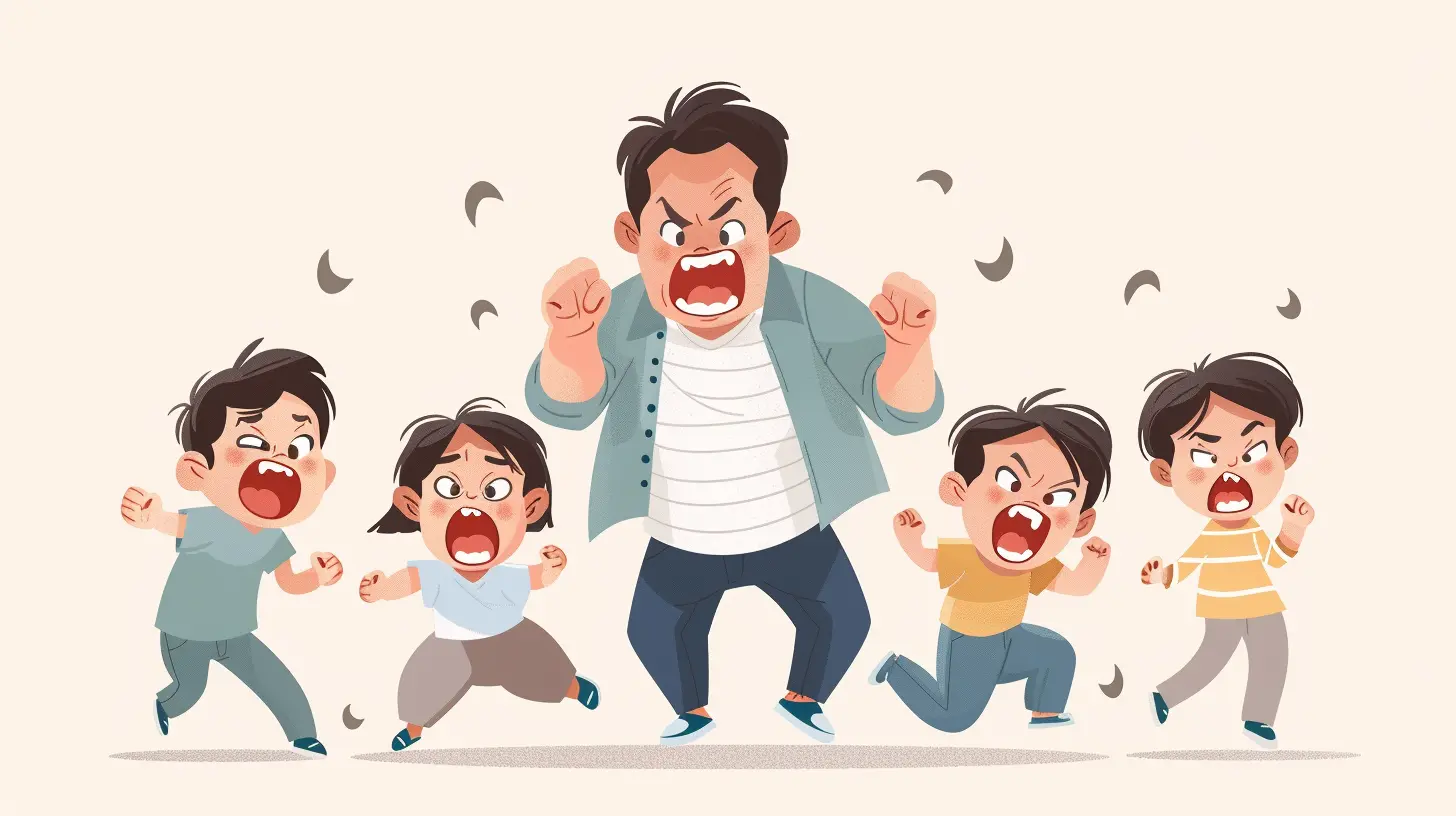Navigating Tantrums: A Stay-At-Home Dad’s Approach to Emotional Growth
23 April 2025
Parenting is a rollercoaster ride, full of highs, lows, and unexpected loop-de-loops. One minute, your child is giggling over their favorite snack, and the next, they’re sprawled on the floor wailing because their toast was cut into triangles instead of squares. As a stay-at-home dad, I’ve had my fair share of epic meltdowns, and over time, I’ve learned that tantrums aren’t just explosions of frustration—they’re windows into a child’s emotional growth.
So, how do you handle tantrums without losing your sanity? Let’s dive into a dad’s approach to managing meltdowns while fostering emotional intelligence.
Understanding the Root of Tantrums
Before we talk strategy, let’s first crack the code on tantrums. Why do they happen?Tantrums are most common in toddlers and preschoolers, who are still developing the ability to express emotions and manage frustration. Sometimes, the cause is obvious—fatigue, hunger, or overstimulation. Other times, it feels like they’re upset over nothing, but underneath, there’s usually an unmet need or overwhelming emotion.
Have you ever felt frustrated when your phone freezes right as you're about to send an important message? That’s what it's like for kids! They don’t have the words or coping skills to handle disappointment, so they react with big emotions.
The Stay-At-Home Dad’s Game Plan for Handling Tantrums
I’ll be honest—when I first became a stay-at-home dad, tantrums threw me for a loop. I wanted to "fix" every meltdown, but I soon realized that tantrums aren’t problems to be solved; they’re opportunities for growth. Here’s how I navigate these stormy moments.1. Stay Calm and Collected
Easier said than done, right? But trust me—your reaction sets the tone. If you meet their meltdown with frustration, it only adds fuel to the fire.When my child starts spiraling, I take a deep breath (or five) and remind myself that they’re not trying to ruin my day. They’re struggling with big emotions, and it’s my job to be their anchor, not their storm.
Tip: If you feel overwhelmed, step back for a moment. Count to ten, take deep breaths, or remind yourself that this phase won’t last forever.
2. Acknowledge Their Feelings (Without Giving In to the Demands)
Kids need to feel heard. When they’re in the middle of a tantrum, they don’t need logic—they need validation.Instead of saying, _“Stop crying over nothing,”_ try saying, _“I see that you’re really upset right now. It’s okay to be mad, but we can’t throw our toys.”_
This simple shift shows them that their emotions are valid while still setting boundaries.
3. Offer Comfort, But Don’t Force It
Some kids want a hug when they’re upset; others need space. My son, for example, goes into "leave-me-alone" mode. Forcing him to talk or accept comfort only makes things worse.I’ve learned to sit nearby and say, _“I’m here for you when you’re ready.”_ Nine times out of ten, he’ll come over for a cuddle once he’s calmed down.
4. Redirect Their Energy
Tantrums are often like runaway trains—once they gain momentum, they’re hard to stop. One trick I’ve found helpful is gently shifting their focus.For instance, if my daughter is on the verge of a meltdown because she can’t have chocolate for breakfast, I might say, _“I know you really want chocolate. How about we make a smoothie together instead?”_
This works best when done early—once they’re in full meltdown mode, distractions don’t always work.
5. Implement Gentle Boundaries
Boundaries are essential, but they don’t have to be harsh. I’ve found that firmness with kindness is the best balance.Instead of saying, _“Stop screaming right now!”_ I try, _“I know you’re upset, but we use quiet voices inside. Let's take some deep breaths together.”_
Consistent boundaries teach kids that it’s okay to feel emotions, but certain behaviors—like hitting or screaming endlessly—aren’t acceptable.
6. Use the Power of Connection
Ever notice how tantrums often come when your child is feeling disconnected? If I’ve been busy with chores or distracted by my phone, my kids tend to act out more.Spending quality time together—whether it’s reading a book, playing a game, or simply snuggling—helps fill their emotional tank and prevents future meltdowns.
Teaching Emotional Regulation Over Time
Tantrums don’t disappear overnight, but with patience and consistency, kids learn healthier ways to express themselves. Here are some long-term strategies that have helped in my parenting journey.Model Emotional Regulation
Kids are watching us all the time—how we handle our emotions teaches them how to manage theirs.If I stub my toe and start cursing like a sailor (been there), my kids pick up on that reaction. But if I take a deep breath and say, _“Ouch, that really hurt! I’m going to take a second to calm down,”_ they learn a healthier way to deal with frustration.
Teach Simple Calming Strategies
Helping kids learn coping skills early on makes a big difference. Some techniques we use in our home include:- Deep Breathing: We do "dragon breaths" where we inhale deeply and "blow out fire."
- Counting to Ten: A simple way to pause before reacting.
- Squeeze and Release: They clench their fists and then relax them to relieve tension.
- Using Words: Encouraging them to say, _“I'm mad because…”_ instead of screaming.
These strategies don’t work instantly, but with repetition, they become second nature.
Encourage a “Feelings First” Household
In our home, we talk about feelings a lot. I want my kids to know that all emotions—including anger, frustration, and sadness—are normal.We use a feelings chart to help name emotions, and we often play games where we make different "feeling faces" to recognize expressions. This helps kids learn that emotions aren’t something to be feared or shoved down but acknowledged and understood.
When to Worry About Tantrums
Most tantrums are just a normal part of childhood, but in rare cases, frequent, extreme meltdowns might signal something deeper.Consider talking to a pediatrician if:
- Your child’s tantrums happen multiple times a day and last for extended periods.
- They regularly harm themselves or others during meltdowns.
- They have extreme difficulty calming down, even after trying different strategies.
- There’s a sudden, drastic increase in tantrums without a clear reason.
Every child is different, and there’s no one-size-fits-all approach. If you’re ever unsure, seeking guidance from a professional is always a good idea.
Final Thoughts: Parenting with Patience and Perspective
Tantrums can be exhausting, frustrating, and even heartbreaking at times. But I try to remind myself that they’re not just inconvenient outbursts—they’re growing pains. Each meltdown is an opportunity for my kids to learn emotional regulation, and for me to practice patience and understanding.Parenthood isn’t about having all the answers—it's about showing up, learning as we go, and giving our kids the tools they need to navigate their big feelings. So the next time your little one has a meltdown in the grocery store over a cereal box, take a deep breath. This, too, shall pass.
And if all else fails? There’s always coffee (or chocolate… lots of chocolate).
all images in this post were generated using AI tools
Category:
Stay At Home DadsAuthor:

Liam Huffman
Discussion
rate this article
4 comments
Foster Reilly
Understanding tantrums as growth opportunities fosters resilience and emotional intelligence in children. Stay patient.
May 3, 2025 at 4:05 AM

Liam Huffman
Thank you for your insightful comment! I completely agree—viewing tantrums as opportunities for growth is essential in fostering resilience and emotional intelligence. Patience is key!
Zelda Daniels
I love this perspective! It's fascinating to see how a dad's approach to tantrums can foster emotional growth. I'm curious about the techniques used and how they can be adapted for different parenting styles!
April 28, 2025 at 4:20 AM

Liam Huffman
Thank you! I'm glad you found it fascinating. The techniques focus on empathy, patience, and open communication, which can be modified to fit different parenting styles by incorporating each parent's unique values and approaches.
Gunnar Stevens
Tantrums aren't failures; they're opportunities for growth. Embrace the chaos, learn from it, and teach your kids resilience. Dads, step up and own this journey unapologetically!
April 26, 2025 at 4:41 PM

Liam Huffman
Absolutely! Tantrums are teaching moments that foster resilience in both kids and dads. Embracing the chaos leads to valuable growth for everyone involved.
Betsy McLain
As a stay-at-home dad, I resonate deeply with the challenges of tantrums. This article captures the essence of turning these tough moments into opportunities for emotional growth. It's a reminder that our responses shape our children's understanding of emotions, and patience truly is key. Thank you for sharing!
April 25, 2025 at 4:41 PM

Liam Huffman
Thank you for your thoughtful comment! I'm glad the article resonated with you and highlighted the importance of patience and emotional growth during those challenging moments.



